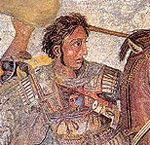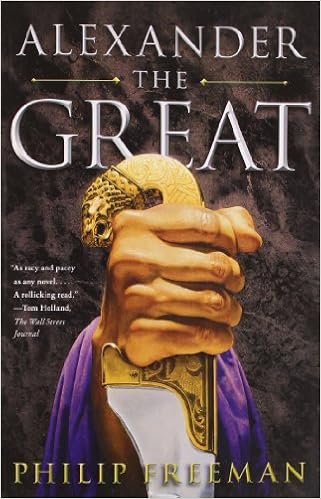Alexander the Great (356 BC – 323 BC) was perhaps the greatest military commander of all time. During one decade, he conquered all of the known world leaving one of the world’s most extensive empires.
 Alexander was born in the northern Greek kingdom of Macedonia, in July 356 BC. His parents were Philip II, King of Macedon, and his wife, Olympias.
Alexander was born in the northern Greek kingdom of Macedonia, in July 356 BC. His parents were Philip II, King of Macedon, and his wife, Olympias.
As a young child, he was tutored by the great philosopher, Aristotle. Aristotle taught a variety of subjects including philosophy, poetry and the ideals of government. To some extent, these ideals influenced Alexander when he was later governing conquered nations.
Alexander had a love of music and books; when asked what is greatest possession was, Alexander replied Homer’s Iliad. However, he also had a ruthless nature which he displayed on being crowned King. Alexander soon moved to have all potential challengers killed (including his infant half-brother)- so he could be the undisputed King. When a friend was found guilty of treason, he also executed his innocent father (who had been a loyal general to Alexander).
On coming to the throne, Alexander united the warring factions in Greece, before leading his army into Persia. Although seemingly outnumbered, Alexander led his army to a decisive victory. It was said that during his reign, Alexander remained undefeated. After beating the Persians, Alexander led his faithful army further east until they came to the regions of Afghanistan and India. Again Alexander proved militarily successful and went onto establish cities in many different countries.
Although Alexander was ruthless in eliminating rivals to the throne, his treatment of occupied territories was remarkably progressive and tolerant. Alexander forbid his troops from raping and pillaging, but, established new democratic governments, incorporating the local customs of the area. He allowed religious tolerance for the different religious groups.
Alexander was famed for being an inspirational military leader. Addressing his troops prior to the Battle of Issus, as quoted in Anabasis Alexandri by Arrian Book II, 7
“Our enemies are Medes and Persians, men who for centuries have lived soft and luxurious lives; we of Macedon for generations past have been trained in the hard school of danger and war. Above all, we are free men, and they are slaves. There are Greek troops, to be sure, in Persian service — but how different is their cause from ours! … And what, finally, of the two men in supreme command? You have Alexander, they — Darius!”
Many stories tell of the loyalty and faith his army had in Alexander. Once they were returning across a desert with hardly any water left. It is said that Alexander’s will alone, kept his troops focused on making the return journey. At one point, his army collected a small pitcher of water from the remaining supplies and offered it to Alexander. Alexander said nothing and disdainfully threw the precious water into the sand. It was incidents like this which created a God-like image around Alexander.
“There is nothing impossible to him who will try.”
Alexander the Great (On taking charge of an attack on a fortress)
Alexander himself said it was only sleep and sex which reminded him he was a mortal.
Alexander enjoyed a passionate life of drinking, womanising and revelling. However, he also admonished his friends who sank too much into sloth and luxury. He retained an interest in philosophy throughout his life, expressing admiration for philosophers, such as Diogenes of Sinope, even if he didn’t follow their lifestyle.
Plutarch records, Alexander saying:
“If it were not my purpose to combine barbarian things with things Hellenic, to traverse and civilize every continent, to search out the uttermost parts of land and sea, to push the bounds of Macedonia to the farthest Ocean, and to disseminate and shower the blessings of the Hellenic justice and peace over every nation, I should not be content to sit quietly in the luxury of idle power, but I should emulate the frugality of Diogenes.” On the Fortune of Alexander by Plutarch., 332 a-b
For a man seemingly invincible on the battlefield, he ironically died at the early age of 32. Alexander’s death came after suffering from a high fever, which lasted for ten days. The cause of this fever is much disputed with some historians attributing it to poison, malaria, typhoid fever or other maladies. However, this 10-day fever is well documented, and it is reported that thousands of members from his army passed by Alexander, while he lay in bed.
Legacy of Alexander the Great
Alexander’s legacy was the spreading of Greek (Hellenistic) culture across a large part of the Middle East and Asia. Alexander greatly increased the contact between the East and West, leading to greater trade and sharing of ideas. Twenty cities bore Alexander’s name, with some cities surviving into the modern age.
Alexander the Great
Alexander the Great by Philip Freeman at Amazon
Citation: Pettinger, Tejvan. “Biography of Alexander the Great”, Oxford, biographyonline.net, 14th July 2014. Last updated 9 December 2017.
Related pages
 Military figures – Famous military leaders and soldiers, including Alexander the Great, Napoleon, Ataturk, Erwin Rommel, Winston Churchill and Dwight Eisenhower.
Military figures – Famous military leaders and soldiers, including Alexander the Great, Napoleon, Ataturk, Erwin Rommel, Winston Churchill and Dwight Eisenhower.

 Ancient Greeks (8th Century BCE to 1 CE) Famous people of the classical Greek period. Poets, statesmen and the fore-runners of democracy. Includes Plato, Aristotle, Socrates and Hippocrates.
Ancient Greeks (8th Century BCE to 1 CE) Famous people of the classical Greek period. Poets, statesmen and the fore-runners of democracy. Includes Plato, Aristotle, Socrates and Hippocrates.

